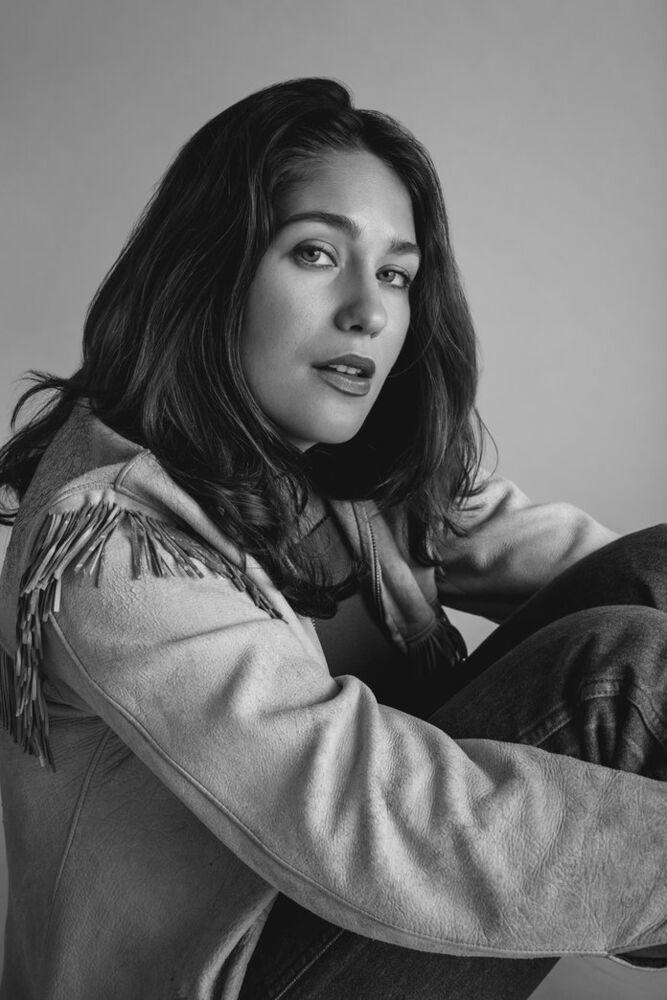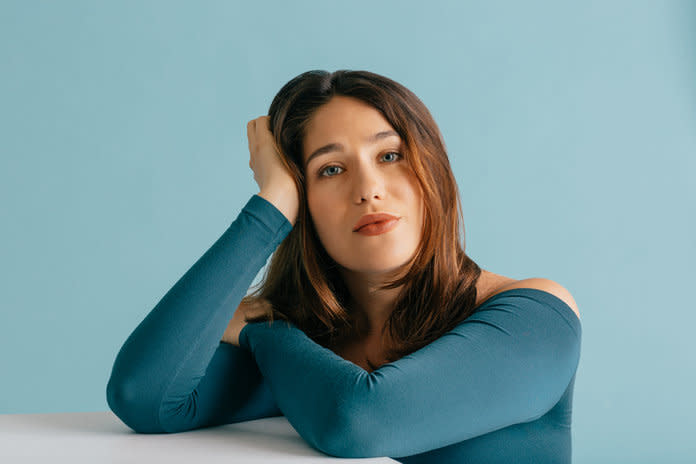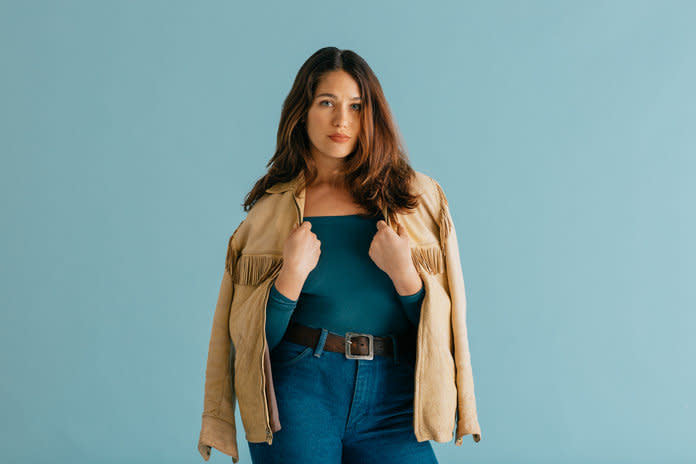Lola Kirke Is Fine with Being “Louisville Famous”
It’s a dreary, wet day in Manhattan when Lola Kirke and I sit down at a French brasserie for lunch, but the weather doesn’t appear to have dampened her mood. The actress and singer, who was born in London and raised in New York, is feeling much more at-home after having recently moved back to the city following a stint in Los Angeles.
“I find L.A. to be a fairly disappointing city,” she says as we sip on glasses of a crisp Sancerre. “I love elements of it. I think there's some really great people. But I think the template for living in Los Angeles doesn't stimulate me very much. It's a lot of downtime, and a lot of time in your car. Part of me deals with so much impostor syndrome that I don't think anything's real unless it's really hard. And life in L.A. is just too easy. But I could be totally wrong. Maybe things don't have to be so hard.”
Though she readily admits to making even a day off to be “the least-relaxing thing ever,” here, in this restaurant sharing “f—king amazing” fries and discussing Harvey Weinstein’s recent guilty verdict (which she’s “feeling f—king awesome" about), it’s clear that her penchant for hard work is part of Kirke’s success in both her acting and music careers. After a break-through role in Gone Girl as the unforgettable Greta (Amy Dunne’s neighbor-turned-thief), she went on to starring roles in Mistress America and Amazon Prime’s Golden Globe-winning original series Mozart in the Jungle. In between, she threw herself into music, releasing a four-track EP in 2016, followed by 2018 album Heart Head West, and her latest, a 2019 EP Friends and Foes and Friends Again.
You could say that whether through the screen or the grooves of a vinyl record — or both — Lola Kirke was born to be an artist. Her father, Simon Kirke, is a drummer, and her mother Lorraine Kirke owned N.Y.C. boutique Geminola, which supplied some of the clothes featured in Sex and the City; her sisters are actress Jemima Kirke and singer Domino Kirke.
Growing up, Kirke says, she was encouraged to be creative, and it clearly paid off, from the versatility in her performances to the Loretta Lynn-esque twang of her music. Creativity came in handy when she was crafting her character in Lost Girls, a dramatization of the unsolved murders of sex workers in Long Island. In it, Kirke plays Kim, a relative of a missing sex worker who is also a sex worker herself. In her hands, the character practically vaults off the screen in a rainbow of fuzzy coats and lipstick, making a poignant impact even without a large chunk of screentime. It was important to her, she says, to enliven the character as much as possible, to give her as many facets as she could.
Ahead, Kirke discusses her preparation for the role, being “famous in Louisville,” and loving “Goop-y bullshit.”

You're an actor and a musician. Did one come before the other for you?
Yeah, I grew up doing the school play and taking acting classes outside of school. I did a lot of theater when I was in college and always knew that that was what I wanted to do, while also being a pretty conscientious music lover. I felt very passionate about learning a lot about my favorite bands ... I didn't really think that I could be a musician because no one really told me I was good at music.
Did they tell you that you were good at acting?
Yeah, I got a lot of positive reinforcement around that, so I just was like, "Oh, I'll be an audience member for music, or a listener.” Maybe it's just the patriarchy. But I think that acting, while there is a lot of technique and skill that is necessary to be a skillful actor, that stuff isn't very immediately apparent. Whereas being a musician, you need to actually know things, you need to have an understanding of rhythm and tempo or how instruments work. Those things just didn't come easy with me, the way math didn't come easy to me. Then I realized that I could bring my more natural abilities to music. It turns out listening to music is a really, really great way to learn about it and become good at it. But I don't know, I'm still not that good. I still struggle with a lot of doubt around it.
You have so much presence in Lost Girls even with relatively little screen time. What kind of prep did you do for the role?
I obviously read the book, and I watched all of the interviews with the woman I was playing. She's a real person, although I took a lot of artistic liberty with her. I studied with a dialect coach, because she had a really specific South Carolina accent.
My character is unique in her position of being both a relative of the missing sex workers and a sex worker herself, and I also thought about the women I know who do sex work. They were so interesting to me in terms of breaking the mold of what my conception of a person who does that kind of work is.
The book and the movie do a lot to destigmatize sex work. Is that something you were thinking about when you were working on this?
Totally. I mean, look, I'm not trying to make everything okay. Sex work should be legalized and regulated as far as I'm concerned. That doesn't mean that there's not deep problems with it that need to be looked at, just as much as anything in capitalism. But yeah, I guess I did want to destigmatize it, but I also wanted to reveal why that stigma is there in the first place.
Your character has so many interesting outfits throughout this movie, did you have a hand in the costuming at all?
Yeah, that was really based on person I know who does sex work, who's just such a rainbow of a person. I didn't want [Kim] to be a regular girl, because she's not. She's an extraordinary person, so I thought her clothes should be extraordinary as well.
From Mistress America to Mozart in the Jungle and even Gemini, you’ve been cast as people who initially seem deferential, but definitely are not. Lost Girls feels a little different from that, maybe more in line with your role in Gone Girl.
It's true. I always think [Gone Girl director] David Fincher is the only person who ever really saw me as I am. It seems like [I’m playing] very polarized people, where I'm either kind of square, or I'm a real jagged edge, completely. I think the real me is somewhere between those two things.
I was going to say, do you feel that duality within yourself?
Yeah. It's also funny the way Hollywood has yet to affirm my physical beauty. They’re always like, "You can be the nerd, but let me take the glasses off. You'll be kind of pretty. Or you'll be trashy." [Laughs] It's done a lot for my reckoning of my sense of self, because I always thought I was pretty good-looking, and then I was like, "Not according to them! Literally not at all." But I mean, I'm fine with it. It's more interesting. I guess it's revelatory of my dysmorphia or something, or theirs. They're probably more dysmorphic than I am.

I was reading old profiles of you where you were discussing feeling like music was a very male-dominated space for you growing up. Do you still feel that way?
Yeah, but less so. I think women are very in right now, and there's a lot of initiatives or space for women. I think sometimes that can be faux. As evidence, the Oscars were just obviously… [trails off]
There were no women directors.
No. There are women actresses though. [Laughs] Yeah, always grateful when a woman is on the Best Actress list.
I mean it’s all dominated by men, but that's shifting. I get anxious sometimes when I sense that this shift is just a trend, and it's just a status quo. It just feels like nothing's really radical if it's still servicing capitalism. I'm not saying that women shouldn't take up more space — the playing field should be leveled, but I'm suspicious of the mainstream being so PC at the moment.
A lot of your songs, like “Sexy Song,” for instance, really explore female sexuality, and you've been pretty openly political. Do you feel a responsibility, as someone with a platform, to speak up?
Sure. Yeah, I mean, yes and no. I just want to be honest about the things, I don't want to be faux. So if I'm thinking about my issues with my own sexuality, and they can be creatively used in a song, then great. But if I'm not thinking about any of those things and I just think that they will make me seem cool, then whatever.
You’re about to reunite with Greta Gerwig [from Mistress America] for an off-Broadway play, Three Sisters. Tell me more about that, have you been looking to do theatre?
I have. I kind of always thought I was going to just be a theater actress, I really love being onstage. That was how I got into acting in the first place, and maybe that's why I've been so drawn to being a musician as well, is the live performance aspect of it.
But yeah, I'm really scared, but I feel like I'll get to do the things I really want to do. Or, that's my sense at least, as far as digging into this work. I don't know, I mean I love being alive, and I think acting is an amazing way to be alive in front of other people. And I think that being on stage is the pinnacle of that. I mean, I do all of this stuff because I want people to feel connected, because I want to feel connected, because life is f—king lonely. [Theatre] is a more immediate way of doing that.
SMALL TALK:
Do you get recognized on the street a lot?
Not that much. I was just in Louisville, Kentucky, and it was the weirdest thing ever — I was like, "I'm really famous in Louisville." It was honestly confusing. This girl came up to me the first night, and she was like, "Are you on that Amazon show?" And I thought it was so odd that I was like, "Oh, Marvelous Mrs. Maisel?" She was like, "No, Mozart in the Jungle." I said, "Oh, right. Yeah, yeah, yeah." [Jokingly] I'm the star of Marvelous Mrs. Maisel. I get recognized a couple of times a month.
What did your childhood bedroom look like?
There were a couple of childhood bedrooms because we moved a lot. My mom is a very, very skilled and talented interior designer — though, a lot of her taste falls somewhere in “Parisian brothel circa like, 1907.” So my childhood bedrooms often resembled that.

What does your typical day off look like?
Obnoxious. My typical day off is like, there's a lot of self-care. I'm very invested in physical and mental and spiritual health. And I'm very lucky to have that time, because I know a lot of people who are actresses or musicians and don't have the luxury of being able to take care of themselves so thoroughly.
What do you do for self-care?
I go to therapy. I exercise. I like massages. I will try any Goop-y bullsh—t. But it's very important that if you quote me on that, that it's “Goop-y bullshit.” But yeah, I want to be a better person, so [I try to do] the things that are hardest — self-awareness, and all that. Oh, and I have probably a dysfunctional amount of friends that I like to see.
I'm very regimented, which surprises some people, because I've given the impression that I'm mildly free in my spirit, but that's not true. I'm extraordinarily type-A and controlling.
What’s your astrological sign?
I'm a Libra with a Gemini rising and a Capricorn moon.
Interesting, it must be that Capricorn moon.
Yeah, that Capricorn moon — I work very hard.
What is your skin care routine like?
I start out with washing my face. There's cold water, rose water spray, and then I have the sunscreen from Arbonne, which may or may not be a Ponzi scheme cult. I feel happy to say that, because they have yet to give me anything free.
And then at night, I've been using an oil, which I put lavender in. And the best thing in the entire world — I'm not even making a joke, this is the Goop-iest sh—t I'll ever say — that jade roller has changed my skin.
What’s something that you’re really excited about right now?
I'm just really excited about the play, honestly. And I'm working on new music right now, I'm just beginning to experiment with what the next record is going to be — nothing concrete yet.
This interview has been edited and condensed for clarity.
Photographs by Erin Glover. Hair by Teddi Cranford. Makeup by Regina Harris. Art direction and production by Kelly Chiello and Erin Glover.

